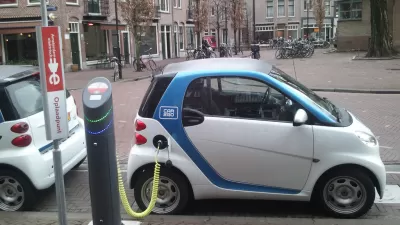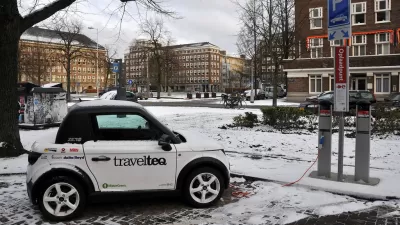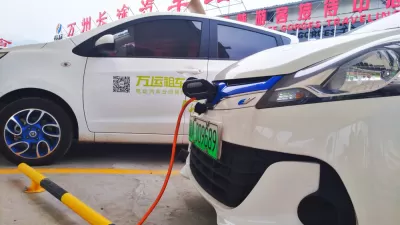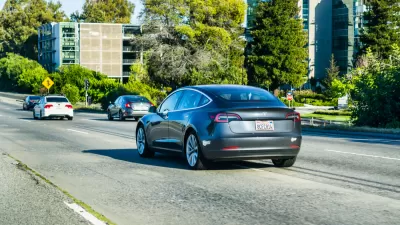In this European country, the Nissan Leaf is the third best seller and Tesla's Model S luxury car is number one. The major reason is not its environmental ethos, which is strong, but because of the perks that EVs receive. What county is it?

It's Norway, where almost 60% of electricity comes from non-carbon sources (nuclear and hydro-electric, per Wikipedia), so EVs make sense from an environmental perspective.
"The latest figures suggest that over 21,000 all-electric vehicles (EVs) are now registered in the country of 5 million people with sales running at over 1,200 a month, or over 10% of all sales," writes John Vidal, the Guardian's environment editor. It's all the more remarkable considering Norway's cold climate, not the most hospitable for EVs as Bill Howard explains for ExtremeTech.
By comparison, in the U.S. "the market share of plug-in electric passenger cars increased from 0.14% in 2011 through 0.37% in 2012 to 0.62% of new car sales during 2013," according to Wikipedia, [Also see "2013 electric vehicle sales jump 84%", The Detroit News, Jan 3.]
So, what's driving EV sales in Norway? It's "the chance of free commuting in the bus lane and generous incentives, says the industry," writes Vidal.
Battery-powered cars in the world's fourth richest country are not just exempt from high rates of purchase tax, and VAT, but pay no road and ferry tolls or parking fees, cost less to insure and can be charged up for free electricity from thousands of points. Local government will also subsidise the installation of charging points in homes. Research suggests the subsidies could be worth nearly £5,000 a year per car.
Alas, these perks may be coming to an end. "Incentives will be withdrawn, or reconsidered, when 50,000 zero emission cars have been registered or come 2018, whichever is the earliest. At the current rate of sales, the 50,000 figure could be reached within 18 months."
Vidal indicates that it might be a good thing that the perks (also referred to as "distortionary incentives" by some energy experts) and EVs stand on their own merits.
The vehicles are now so popular that they dominate the bus lanes into Oslo, making up to 75% of the vehicles alowed [sic] in them. In addition, it's getting harder and harder to find unoccupied public charging facilities. [Similar issue arose with charging EVs in Silicon Valley.]
What's particularly noteworthy is that Norway is the world's tenth largest oil exporter. Could they set a model for other oil producing nations, like Venezuela, ninth on the export list, that subsidize gasoline prices rather than subsidize EV driving?
FULL STORY: Norway has fallen in love with electric cars – but the affair is coming to an end

Maui's Vacation Rental Debate Turns Ugly
Verbal attacks, misinformation campaigns and fistfights plague a high-stakes debate to convert thousands of vacation rentals into long-term housing.

Planetizen Federal Action Tracker
A weekly monitor of how Trump’s orders and actions are impacting planners and planning in America.

In Urban Planning, AI Prompting Could be the New Design Thinking
Creativity has long been key to great urban design. What if we see AI as our new creative partner?

King County Supportive Housing Program Offers Hope for Unhoused Residents
The county is taking a ‘Housing First’ approach that prioritizes getting people into housing, then offering wraparound supportive services.

Researchers Use AI to Get Clearer Picture of US Housing
Analysts are using artificial intelligence to supercharge their research by allowing them to comb through data faster. Though these AI tools can be error prone, they save time and housing researchers are optimistic about the future.

Making Shared Micromobility More Inclusive
Cities and shared mobility system operators can do more to include people with disabilities in planning and operations, per a new report.
Urban Design for Planners 1: Software Tools
This six-course series explores essential urban design concepts using open source software and equips planners with the tools they need to participate fully in the urban design process.
Planning for Universal Design
Learn the tools for implementing Universal Design in planning regulations.
planning NEXT
Appalachian Highlands Housing Partners
Mpact (founded as Rail~Volution)
City of Camden Redevelopment Agency
City of Astoria
City of Portland
City of Laramie





























